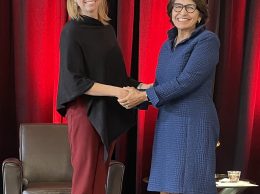Dubroff: Lacayo’s genius was his ability to balance competing interests

Henry Dubroff
There were two reasons why the late Henry “Hank” Lacayo insisted that his United Auto Workers negotiators wear suits and ties when they sat down with management to hammer out a new contract.
The first was to send a signal that the union team was socially equal to the management negotiators. The second was to respect the free enterprise system that brought management and labor to the table.
Lacayo, who died May 1 at 85, was a study in contrasts. He was a high school graduate with the vocabulary of a college professor. He was a national leader of organized labor who counted company CEOs among his closest allies and friends.
In retirement, Lacayo became active in politics, which is why 350 community leaders, including most of the political elite of Ventura County, turned out on a Saturday afternoon for a June 24 celebration of his life at the John Spoor Broome Library at CSU Channel Islands.
Assembly member Jacqui Irwin, Sheriff Geoff Dean and U.S. Rep. Julia Brownley all described how Lacayo’s encouragement had changed the trajectory of their careers.
A Ventura County judge told me how Lacayo had unexpectedly reached out to him, a Republican, because, Lacayo told him at the time, he had earned a reputation for integrity. Lacayo’s endorsement helped him win appointment.
Amid stories about Lacayo’s love of fishing vacations, his five drawers full of loud-colored socks, and his relentless capacity for networking, was his ability to balance competing interests. That ability to balance was a talent that’s sorely missing in today’s winner-take-all political environment.
I got to know Lacayo first at a chance meeting at the home of Tim McCallion, then president of Verizon’s California operations. Later we served together on the CI Foundation board. I got to visit his home and the amazing wall of photos of Lacayo with national and international leaders.
He told me many times that his approach to negotiations was to understand that a business has to earn a profit to remain viable. The goal was to preserve profits and get fair treatment for workers.
He struck a balance between advocating for jobs and economic development, and the social justice issues. Democrats will have to learn how to restore that balance if they want to govern successfully in California and compete on a national stage.
One of the people who attended the Lacayo tribute was Herb Gooch, a professor of political science at California Lutheran University and one of the best political analysts in the region.
“It was his splendid way of balancing an unassailable commitment to social justice with a pragmatic appreciation of the possible which made him so effective,” Gooch said. “It didn’t hurt to bring everyone into the conversation, not letting seeking for the best be the enemy of the very good.”
Lacayo wound up supporting some projects — a liquefied natural gas port and other infrastructure projects — that were unpopular and anathema to social justice and environmental activists.
But he understood that providing a path to middle class for all was the key to ending economic injustice. That’s why he was a big believer in education, particularly higher education. He understand, too, that an America that could dominate the global energy markets would create plenty of jobs and have a much more secure future.
In his prime, Lacayo’s political acumen spanned the country. The Chicago-based Hispanic Leadership Institute he founded hands out an award in his name every year.
Which is why a comment from Chicago Mayor Rahm Emmanuel that showed up in a June 25 Maureen Dowd column in the New York Times struck a chord with me. Democrats need to choose candidates who are more pro middle class, not merely pro poor, she quotes him as saying.
Lacayo was successful because he learned the lessons of balancing opposing interests early and never forgot them. From health care to energy to tax policy, they are lessons we seem to be learning over and over again.
• Reach Editor Henry Dubroff at [email protected].











